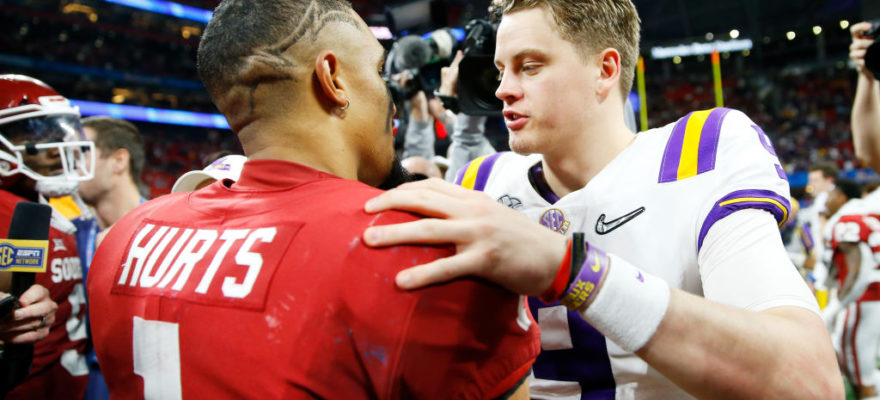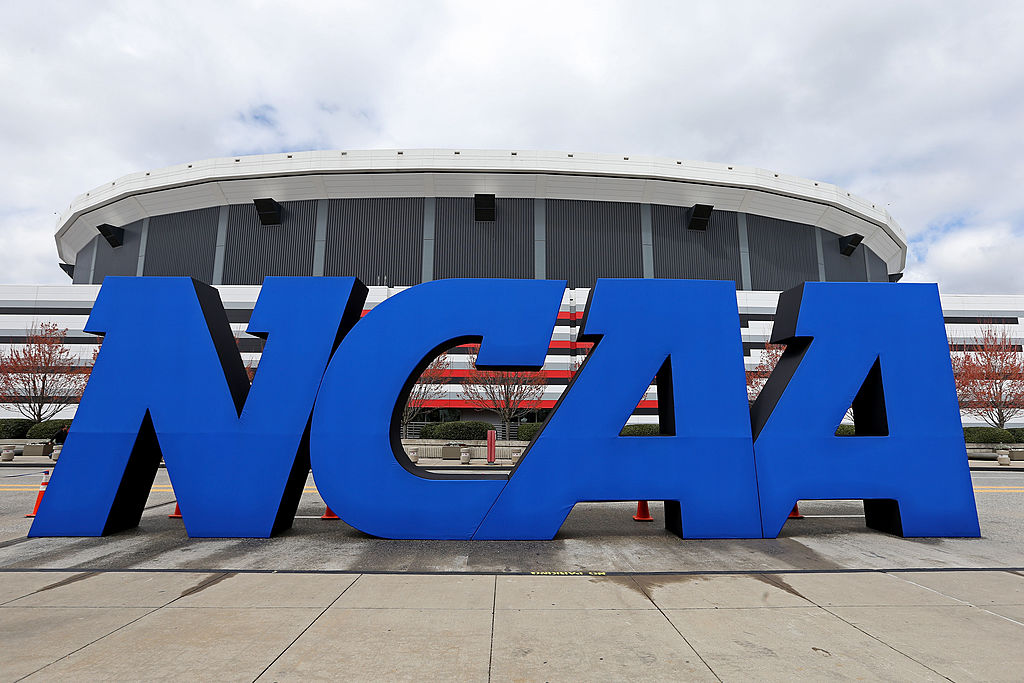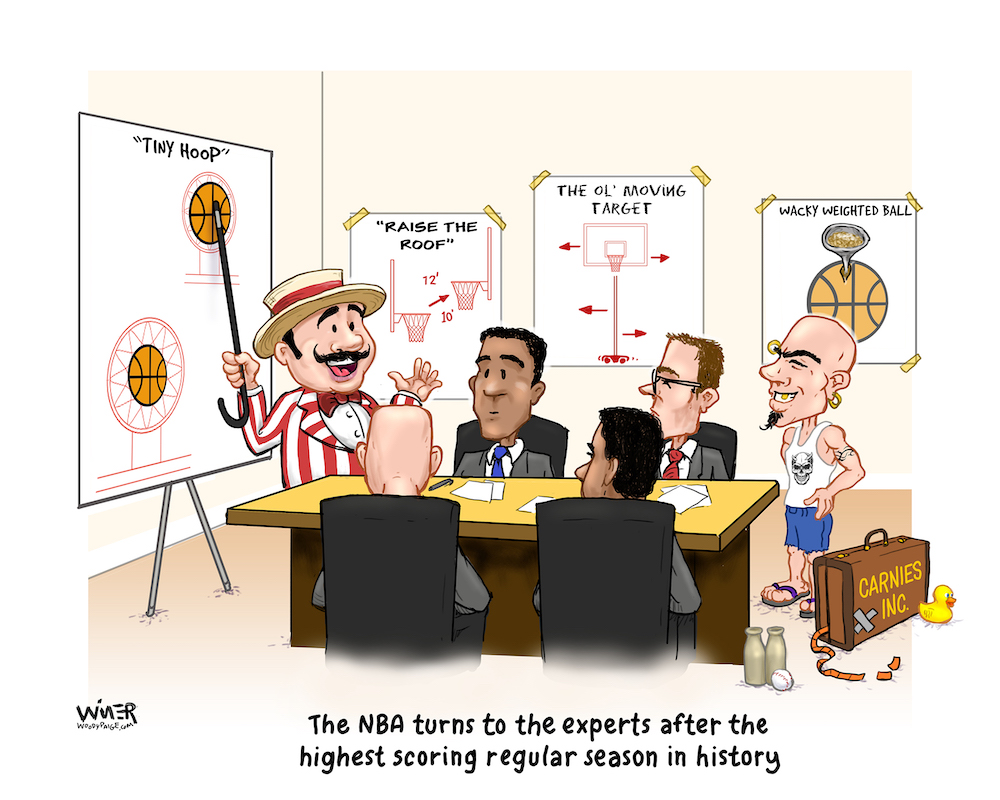Roll call of the four College Football Playoff starting quarterbacks:
— Justin Fields started out at Georgia and transferred to Ohio State.
— Jalen Hurts started out at Alabama and transferred to Oklahoma.
— Joe Burrow started out at Ohio State and transferred to Louisiana State, where he became the 2019 Heisman Trophy winner.
— Trevor Lawrence started out at Clemson – and has stayed there.
After LSU’s 63-28 rout of Oklahoma and Clemson’s 29-23 win over Ohio State in the Saturday semifinals, it will come down to Burrow, a senior, and Lawrence, a sophomore, taking the snaps in the January 13 CFP national championship game in New Orleans.
The Tigers – the Clemson Tigers, that is – will be seeking their third CFP championship in the last four years. And this will be their fourth appearance in the seven-season existence of the CFP. If they win as the No. 3 seed this time, it will continue the tradition of the No. 1 seed never having won the title.
Perhaps it’s because we so predominantly focus on quarterbacks in watching and chronicling the college game, but the movement among those who play the position has become akin to following offseason deals in Major League Baseball.
It’s a bit dizzying.
And transfers at all positions, aided by the NCAA’s transfer portal, now at times can seem to be as much of the college game as recruiting and national letters of intent.
It also is complicated by the fact that if athletes with remaining eligibility have received their degrees, they can transfer and play the next season – rather than sit out a season under the usual undergraduate protocol.
Burrow was an exceptional example: He had been at Ohio State through only two seasons when joining LSU in early 2018, but he already had graduated and could play that fall as a junior in eligibility. There was no wait.
The trends will continue, regardless. With players essentially expected to be on the campus year-round for summer workouts, staying in school year-round and graduating in three seasons – whether it’s a quarterback or anyone else – is not as monumental a task as it otherwise might seem.
If a player has been red-shirted, he usually has been on the campus for nearly three and a half years by the end of his junior season.
Also, some now graduate from high school at mid-year and report to college at the beginning of a calendar year.
Under any circumstances, whether they play as true freshmen or redshirt, it’s now wise for players to take enough credits to be in position to be graduated and have the option of transferring to play as a senior somewhere else.
It all means that in 2020, many starting quarterbacks will be graduate transfers who are seniors in eligibility and were somewhere else in 2019. It’s almost as if that’s part of the ritual now, to assess who’s out there, who might be able to come in for a final year of eligibility. And it’s not just the powerhouses or the Power 5.
A working example could be the Mountain West’s Colorado State. In 2018, the Rams’ starter much of the season was Washington graduate transfer K.J. Carta-Samuels. In 2019, it was Nebraska transfer Patrick O’Brien, a junior in eligibility who had left Lincoln after his redshirt freshman season of 2017 and had to sit out 2018. The reason they played was that highly touted Collin Hill underwent three ACL surgeries in three years and even when able to play in 2018 was rehabilitating on the fly.
And now?
After Mike Bobo, the former Georgia assistant who first spotted Hill at a high school 7-on-7 tournament camp in Athens, was ousted and signed on as offensive coordinator under Will Muschamp at South Carolina, Hill – who is from South Carolina and has graduated – has announced his intention to transfer to rejoin Bobo. Hill didn’t get an offer from Georgia after elite recruit Jacob Eason, from the Seattle area, committed to the Bulldogs. Eason later transferred – back to his home-area program, the Washington Huskies.
At South Carolina, Bobo inherits a quarterback, Southern Californian Ryan Hilinski, who started and threw for 2,357 yards as a freshman after starter Jake Bentley was injured in the season opener. Bentley has announced he’s leaving South Carolina to transfer to Utah for the 2020 season. So it seems likely that Hill, who is close to Bobo and knows his offense all the way through the iPad, is signing on as what amounts to a player/graduate assistant coach/insurance policy for 2020 with the Gamecocks.
Everything’s connected.
That’s just one example of the QB merry-go-round, and it seems likely that a graduate transfer will be the No. 1 QB at several other programs in the Pac 12, which loses a handful of starters, including Oregon’s Justin Herbert and Colorado’s Steven Montez.
As with most things college football, adjustments made in the name of common sense and/or realism lead to the next question:
Why stop there?
Although a full athletic scholarship was lucrative compensation to start with, the Power 5 leagues led the way to adopting additional Cost of Attendance stipends in 2015, and the Group of 5 schools followed. They had little choice.
Then with a California law forcing its hand, the NCAA went along with the move toward allowing athletes to be compensated for the use of their name, image and likeness.
The theory is sensible but the perils are many, mainly involving the potential for income guarantees in recruiting.
That presumably will be illegal when the rules are formalized, yet the system will encourage the return of boosters funneling money to players – and if the proponents won’t admit that, their heads are in the sand.
The point is, we’ve become accustomed to movement, even in college sports. (Basketball players are even more transient.)
So get rid of the requirement for undergraduates to have to sit out a year after transferring.
Let them all become immediately eligible.
Once.
That allows for regrets or second thoughts about choices, realistic assessments of where they fit on depth charts, or provides an exit mechanism after a coaching change. There is no need to try to come up with a hardship scenario to strike down the one-year wait.
For all the lecturing to prospects that they’re picking a school and program, not a coach in a business of short-term tenures, many make their choices on the basis of the head coach and his staff.
And I’ll just toss this out: If the NCAA wants to combat the widening of the gap between the Power 5 and Group of 5 leagues, it could allow transfers from Power 5 to Group of 5 programs to be eligible at their new schools immediately.
In other words, widen the portal.
About Terry: Terry Frei is the author of seven books. His novels are Olympic Affair and The Witch’s Season, and among his five non-fiction works are Horns, Hogs, and Nixon Coming; Third Down and a War to Go; and ’77: Denver, the Broncos, and a Coming of Age. Information is available on his web site, terryfrei.com. His woodypaige.com archive can be found here.

















